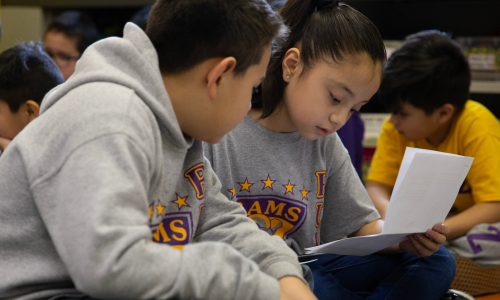 While “tests” are often the first thing that comes to mind when you hear the word “assessment,” a balanced assessment system encompasses a wide range of methods for evaluating a child’s academic, social, and emotional abilities. Broadly defined, assessment is the process of gathering evidence of student learning to inform decision-making. But what do assessment-literate strategies actually look like?
While “tests” are often the first thing that comes to mind when you hear the word “assessment,” a balanced assessment system encompasses a wide range of methods for evaluating a child’s academic, social, and emotional abilities. Broadly defined, assessment is the process of gathering evidence of student learning to inform decision-making. But what do assessment-literate strategies actually look like?
My colleagues Amelia Gotwals and Cara Jackson offer seven research-backed assessment practices that support classroom learning in our recent publication in Principal Leadership.
- Use purpose-driven assessments. Assessment can be used for a variety of purposes, including informing instructional strategies or quantifying students’ knowledge at a given point in time. However, regardless of the purpose, assessments should be linked to specific educational decision-making.
- Clarify learning targets. Students have a better chance of success when teachers make the learning targets clear.
- Use everyday data in new ways. Across disciplines, teachers continually collect and respond to evidence of student learning in a variety of ways. It is important to recognize how students’ verbal and written responses are also assessments that can be used to make instructional decisions.
- Integrate assessment and teaching. Assessment-literate teachers use assessment results to adjust instructional strategies. Teachers use data in multiple ways, including to identify student strengths and weaknesses, determine approaches to remediation or re-teaching, to pace lessons, identify curricular topics, and differentiate or make grouping decisions.
- Join forces with colleagues. Assessment-focused collaboration orients discussion around student achievement and provides an opportunity to jointly plan instruction in response to data.
“It benefits our students most if we collaborate on assessments and planning. What this ensures is that all of our students are receiving access to the same educational opportunities. After several years of working together, we are able to refine our practices and streamline our learning tasks to make sure they meet learning objectives. Using common assessments allows us to compare student achievement across the grade level. We reflect together on student learning and opportunities for improvement, as well as identifying concepts that need to be clarified or re-taught. This year we are focusing on clear learning targets with clear rubrics that are a part of our Standards-Based Grading process. We are now sharing our lesson plans and materials with other schools through shared district folders, district meetings, and emails.”
– Shawna Gilmore and Burton Melancon, 8th grade science teachers, Lincoln Middle School, NM
-
 Communicate with students and families. Assessments are valuable to students because they can demonstrate what they know, their progress over time, and help them set goals. In addition, assessment results can enable teachers to have informed conversations with students, parents, and guardians.
Communicate with students and families. Assessments are valuable to students because they can demonstrate what they know, their progress over time, and help them set goals. In addition, assessment results can enable teachers to have informed conversations with students, parents, and guardians. - Recognize that context matters. District and school building conditions can support or constrain assessment literate practices. Organizational factors that impact data use include:
- Professional development and coaching of assessment literate practices
- Institutional expectations and norms for assessment data use
- Availability of computerized information management systems and tools
- Protocols to structure teachers’ discussions of assessment data
- A school climate of collegiality and trust
To read more about assessment-literate strategies for educators, check out some of our past posts on assessment literacy here on Teach. Learn. Grow.







